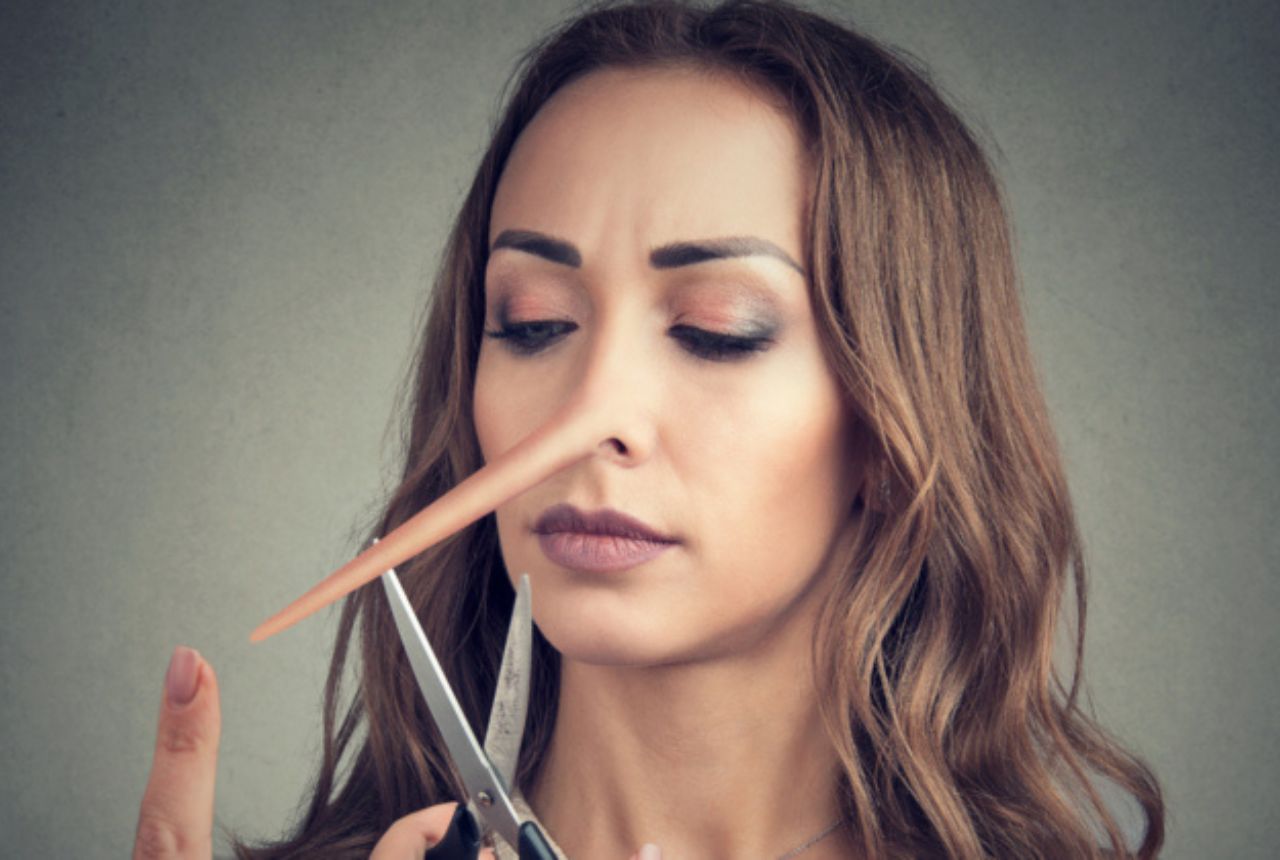Have you ever had that uneasy feeling during a conversation where something just didn’t sit right?
Maybe it was the way they avoided your gaze, or how their story didn’t quite add up.
Most of us rely on intuition when spotting dishonesty, but did you know that psychology can back up many of those gut instincts?
Lying is as old as human interaction itself.
People lie for all sorts of reasons—fear, insecurity, or simply because they think they can get away with it. But dishonesty isn’t as seamless as we might think.
In fact, lying often leaves behind telltale signs in a person’s behavior, tone, or even body language.
Over time, psychologists have studied these patterns, identifying key indicators that can suggest when someone isn’t being entirely truthful.
It’s fascinating how small, almost imperceptible actions can reveal so much.
However, spotting dishonesty isn’t about jumping to conclusions.
It’s about noticing patterns and understanding context.
In this blog post, we’ll unpack ten psychological signs that someone might not be honest.
These insights, while not foolproof, can help you develop a sharper eye for deception and protect yourself from manipulation.
1. Inconsistencies in Their Stories
One of the clearest signs of dishonesty is when someone’s story doesn’t stay consistent.
Think about it—truth is straightforward. It doesn’t change because it’s rooted in real events.
However, lies are complex. They require imagination, improvisation, and, most importantly, memory.
Get Smarter Everyday Join Us On WhatsApp
When a person lies, they have to remember the fabricated details they’ve shared.
Over time, they might forget some parts, add unnecessary embellishments, or contradict themselves altogether.
For example, imagine someone telling you they were late to work because of car trouble.
The first time, they say their battery died. Later, they mention they ran out of gas. Which is it? This inconsistency can be a major red flag.
Honest people don’t struggle to recount their experiences because they’re simply telling the truth.
Liars, however, often trip over the web of stories they’ve spun, and that’s when you’ll notice the cracks.
2. Avoidance of Eye Contact
Eye contact is a powerful form of non-verbal communication.
It conveys trust, confidence, and connection. But when someone avoids your gaze, it can make you question their intentions.
I’ve experienced this before. A colleague of mine would consistently look away during conversations, especially when we discussed sensitive topics.
It was as if they couldn’t face me. At first, I brushed it off as nervousness, but over time, I began to suspect they weren’t being entirely truthful.
Psychologists suggest that avoiding eye contact can indicate guilt or deceit.
When someone lies, they may subconsciously feel exposed or vulnerable, leading them to avert their gaze.
It’s a defense mechanism—if they don’t look at you, they think you might not see through them.
That said, not everyone who avoids eye contact is lying. Some people are naturally shy or introverted.
But when someone who’s usually confident suddenly can’t meet your eyes, it’s worth paying attention.
Get Smarter Everyday Join Us On WhatsApp
3. Excessive Face Touching
Body language often reveals what words try to hide.
One of the most studied indicators of dishonesty is excessive face touching during a conversation.
When someone lies, their body experiences stress, triggering subtle physical responses.
Research shows that lying can increase blood flow to the face, especially the nose, causing itchiness or discomfort.
As a result, liars might touch their face, rub their nose, or even cover their mouth unconsciously.
I remember observing this behavior in a friend who was explaining why they missed an important event.
Their story was plausible, but they kept touching their mouth and nose while speaking.
It made me question whether they were entirely honest.
Of course, face-touching alone isn’t enough to label someone a liar.
People touch their faces for many reasons—nervousness, habit, or even an itch.
But when combined with other signs, it can be a telling clue.
4. Providing Too Much Information
Have you ever asked someone a simple question, only for them to launch into a detailed explanation that goes far beyond what you needed?
This tendency to over-explain can be a sign of dishonesty.
Liars often feel the need to justify themselves excessively.
Get Smarter Everyday Join Us On WhatsApp
They worry that their story might not seem convincing, so they fill in the gaps with unnecessary details.
By overwhelming you with information, they hope to distract you from noticing inconsistencies or questioning their motives.
For instance, if you ask a friend why they’re late, an honest response might be, “Traffic was bad.”
A dishonest person, however, might say, “There was this huge accident on the freeway, and then I took a wrong turn, and my GPS started acting up…”
The extra details aren’t always needed—they’re there to make the lie seem more believable.
It’s important to ask yourself: why are they providing so much information? Are they being thorough, or are they trying to hide something?
5. Discomfort with Silence
Silence is powerful. It can make people uncomfortable, especially if they have something to hide.
Dishonest people often rush to fill gaps in conversation.
They fear that silence might give you time to analyze their words or pick up on inconsistencies.
As a result, they might ramble, repeat themselves, or change the subject abruptly.
I’ve noticed this in conversations with people who seemed uneasy.
When I let the silence linger, they’d quickly start talking again, sometimes over-explaining or veering off-topic.
It was as if they couldn’t bear the quiet.
This behavior doesn’t guarantee dishonesty, but it can be a useful observation.
Pay attention to how someone reacts to pauses in conversation. Are they comfortable, or do they seem anxious to fill the void?
Get Smarter Everyday Join Us On WhatsApp
6. A Lack of Empathy
Dishonesty often goes hand-in-hand with a lack of empathy.
When someone lies, they prioritize their own needs—whether it’s to avoid consequences, gain an advantage, or protect their image—over the feelings of others.
I’ve seen this play out in personal relationships. A friend once lied to me about something that deeply affected me.
When I confronted them, their reaction wasn’t one of understanding or remorse. Instead, they seemed more concerned with defending themselves.
It made me question whether they ever truly valued my feelings.
Liars often detach themselves emotionally from their actions.
This detachment allows them to lie without feeling the full weight of how their dishonesty impacts others.
Over time, this emotional distance can erode trust and connection in relationships.
7. Deflecting Blame
Honest individuals take responsibility for their actions. Dishonest people, however, often go out of their way to avoid accountability.
In group settings, I’ve seen this behavior repeatedly.
A team member underperforms but instead of owning up to their mistakes, they point fingers at others.
They claim they weren’t given enough tasks or blame external factors for their shortcomings.
Psychologists note that this deflective behavior is a hallmark of dishonesty.
It stems from a desire to protect one’s image at all costs.
Get Smarter Everyday Join Us On WhatsApp
If someone in your life consistently avoids taking responsibility and shifts blame onto others, it’s worth questioning their honesty.
8. Overly Defensive Reactions
Defensiveness can be a natural response when someone feels attacked or wrongly accused, but an overly defensive reaction can be a strong indicator of dishonesty.
When people tell the truth, they usually feel secure in their facts.
They can calmly explain themselves and respond with confidence because they know their story aligns with reality.
There’s no internal conflict, so their response remains measured and straightforward.
However, when someone is lying, they might feel threatened when questioned, leading to an exaggerated defensive response.
This could include raising their voice, becoming visibly agitated, or even launching counter-accusations to divert attention away from themselves.
I once encountered a friend who, when lightly questioned about an obviously exaggerated story, suddenly became combative and defensive.
Instead of a simple clarification, their reaction was to criticize me for doubting them, which felt disproportionate to the situation.
The truth is, defensiveness serves as a shield for liars. It’s an attempt to shift focus from the lie itself to the person asking questions.
While everyone can be defensive from time to time, especially on a bad day, persistent and extreme defensiveness is often a sign that there’s more going on beneath the surface.
9. Frequent Use of Qualifying Language
Language is powerful, and the words people choose can reveal more about their intentions than they might realize.
Qualifying language is a subtle but common tool used by dishonest individuals to create loopholes in their statements.
Phrases like “to the best of my knowledge,” “as far as I remember,” or “I might be wrong, but…” often precede statements that are intentionally ambiguous or incomplete.
Liars use this language as a buffer, giving them room to backtrack if they’re caught.
Get Smarter Everyday Join Us On WhatsApp
It’s a way of making statements sound truthful without fully committing to them.
For example, if someone says, “As far as I remember, I didn’t see anyone else there,” they’re allowing for the possibility to later change their story under the guise of a poor memory.
This tactic is often used to subtly evade accountability and create a safeguard against being caught.
We all use these phrases occasionally, especially when uncertain or discussing complex topics.
But if someone consistently employs this kind of language when they should be clear and direct, it’s worth questioning their honesty.
If they truly remember something, why aren’t they speaking with confidence?
10. Guilty Demeanor and Body Language
A guilty conscience is hard to hide, and often, our body language betrays us even when our words do not.
Body language experts and psychologists agree that non-verbal cues are crucial indicators of a person’s emotional state and potential honesty.
When someone is lying, they might display subtle signs of guilt or discomfort.
This can include fidgeting, shifting weight, sweating, or changes in their voice pitch.
Guilt often manifests in physical tension, making a person appear restless or uneasy.
I once had a conversation with a friend who was hiding something significant.
Though their words seemed carefully chosen, I noticed small cues—sweaty palms, frequent swallowing, and a slight tremor in their voice.
These signs suggested an underlying unease that their confident words couldn’t conceal.
Get Smarter Everyday Join Us On WhatsApp
Guilt also makes people wary of direct questions. They might avoid answering them altogether, respond with vague statements, or deflect to unrelated topics.
If you observe someone who consistently dodges direct questions or exhibits nervous body language, their guilt might be surfacing in ways they can’t control.
Understanding body language takes practice and patience.
It’s not just about identifying isolated gestures but recognizing patterns that suggest guilt or deceit.
The key is to trust your intuition and observe the overall behavior rather than individual moments.
Conclusion
Spotting dishonesty isn’t about paranoia or mistrust—it’s about being mindful and informed.
Human behavior is complex, and no single sign guarantees deception. The key is to observe patterns over time.
If you notice multiple signs, like inconsistent stories combined with excessive defensiveness or a lack of eye contact, it’s worth considering that the person may not be entirely honest.
Honesty and integrity form the foundation of healthy relationships, whether personal or professional.
When you recognize these patterns of dishonesty, it allows you to make more informed decisions about who you trust and how you interact with them.
Always trust your instincts. Your intuition often picks up on subtle cues that your conscious mind might miss.
The more you understand these psychological signs, the better equipped you’ll be to navigate complex social interactions and protect yourself from deceit.
At the end of the day, honesty is a two-way street.
While it’s crucial to be aware of the signs of dishonesty in others, it’s equally important to reflect on our own behavior and strive for transparency and authenticity.
After all, trust is built on mutual respect and a commitment to truth.
Get Smarter Everyday Join Us On WhatsApp







